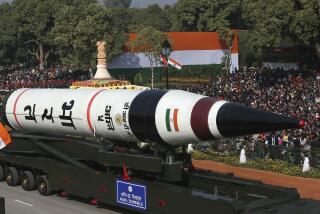India-Pakistan cricket match has region abuzz
Wednesday’s semifinal Cricket World Cup match between nuclear-armed rivals India and Pakistan is the hottest ticket in town, with national pride and claims of sports superiority on the line. Mix in geopolitics, the threat of a terrorist attack and warnings against match-fixing and you’ve got an event that is captivating the subcontinent.
“Every roadside shop will be watching,” said Ayaz Amir, a Pakistani columnist and lawmaker. “Basically, India and Pakistan will be closed on Wednesday.”
The match took on additional weight last week when Pakistani Prime Minister Yousuf Raza Gilani accepted an invitation from Indian Prime Minister Manmohan Singh to watch the match with him at a stadium here in northwestern India. The two sides have resumed talks stalled in 2008 by the terrorist attack in the Indian city of Mumbai that was planned on Pakistani soil. The assault killed 166 people.
The hoopla has set off a crush of Bollywood stars, lawmakers and sharp-elbowed wannabes pulling every string to attend, muscling aside ordinary fans. Private planes are so stacked up at nearby Chandigarh airport that pilots have been asked to drop off their precious cargoes and fly on.
Pakistani parrots and Indian numerologists have clogged the airwaves predicting the outcome and Facebook campaigns are being waged on both sides of the border to declare Wednesday a holiday. Some companies are setting up televisions in cubicles; others have told workers to stay home.
Television ads are going for $260,000 a minute, among the highest rates ever seen here, scalped tickets reportedly are selling for up to 100 times their face value.
“All my friends are really, really jealous I got a ticket,” said Amit Mangal, 26, a consultant who navigated a gantlet of security to reach the ticket booth Tuesday. “All the political attention makes it more difficult for sports fans, though. My parents are worried whether I’ll be safe.”
The extraordinary attention has raised concern about a possible terrorist attack. Early this month, security watchdog Interpol said it had foiled a planned attack against the tournament, without revealing the intended target among the venues here and in Bangladesh and Sri Lanka. Pakistan has formally asked India to step up security.
Analysts said an attack on the stadium would be difficult. The airspace above it has been declared a no-fly zone, with surveillance drones, antiaircraft guns and paramilitary forces deployed in what’s been dubbed “Fortress Mohali.”
More likely is an attack nearby designed to bring an extremist group the global attention it craves.
“Terrorists know it will be very difficult to disrupt the match,” said B. Raman, former head of the Research Analysis Wing, India’s equivalent of the CIA. “The danger is they’ll go for softer targets nearby. We’ll just keep our fingers crossed.”
Amid hope that it will reduce tension between India and Pakistan, which have fought four wars since gaining independence from Britain more than six decades ago, the match has drawn comparisons with the 1970s pingpong diplomacy that jumpstarted U.S.-China relations. A key difference, analysts said, is that Singh’s invitation was rather impulsive, without the careful policy groundwork done by President Nixon and Secretary of State Henry Kissinger.
“Pingpong with China was never just about pingpong,” said Victor Cha, director of Asian studies at Georgetown University. “Kissinger and Nixon already had plans in play to warm to China.”
Others say Singh, no great cricket fan, was seeking to distract Indian voters from corruption scandals battering his government. They note that a diplomatic breakthrough is unlikely given that Pakistan’s real powerbrokers, army chief Gen. Ashfaq Kayani and its top spymasters, weren’t invited and won’t be in the stands.
“The prime minister pulled a stunt,” said Brahma Chellaney of Delhi’s Center for Policy Research. “And since there was no preparation, Gilani is unable to deliver anything.”
Whoever wins Wednesday’s match will play Sri Lanka in the final Saturday. India has won all four of its Cricket World Cup meetings with Pakistan, and Indian bookies favor their nation’s team 2-to-1.
Some analysts and sports columnists decried the jingoistic tone of hyperactive television networks and fans and fear unrest if India loses.
“I see no chance the Indian fans will be as gracious as the Pakistanis were when they last met in Lahore in 2004,” said Pradeep Magazine, a sports columnist, who recalls Pakistani fans cheering the Indian side when it won. “My fear is, if India loses, it’s the Indian players who will need security, almost as if they lost a war.”
If Pakistan wins, it will be huge for that country, others said.
“Pakistan’s been at the center of so much bad news: terrorism, strikes, the blasphemy laws, even cricket scandals,” said Amir, the Pakistani columnist and lawmaker.
“The morale of the nation has received a huge boost even getting this far. It’s the first good news we’ve had in a while.”
Times staff writer Alex Rodriguez in Islamabad, Pakistan, and Anshul Rana in The Times’ New Delhi bureau contributed to this report.
More to Read
Start your day right
Sign up for Essential California for news, features and recommendations from the L.A. Times and beyond in your inbox six days a week.
You may occasionally receive promotional content from the Los Angeles Times.






